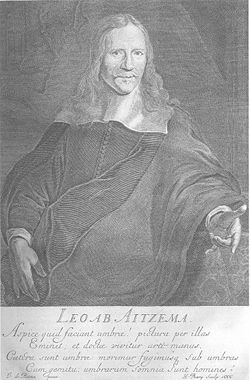
Leo Aitzema
Encyclopedia

Netherlands
The Netherlands is a constituent country of the Kingdom of the Netherlands, located mainly in North-West Europe and with several islands in the Caribbean. Mainland Netherlands borders the North Sea to the north and west, Belgium to the south, and Germany to the east, and shares maritime borders...
historian
Historian
A historian is a person who studies and writes about the past and is regarded as an authority on it. Historians are concerned with the continuous, methodical narrative and research of past events as relating to the human race; as well as the study of all history in time. If the individual is...
, diplomat, bon-vivant, philanderer and spy.
He was born at Dokkum
Dokkum
Dokkum is a Dutch fortified town in the municipality of Dongeradeel in the province of Friesland. It has 13,145 inhabitants . The fortifications of Dokkum are well preserved and are known as the bolwerken . - History :...
, in Friesland
Friesland
Friesland is a province in the north of the Netherlands and part of the ancient region of Frisia.Until the end of 1996, the province bore Friesland as its official name. In 1997 this Dutch name lost its official status to the Frisian Fryslân...
. In 1617 he published a volume of Latin
Latin
Latin is an Italic language originally spoken in Latium and Ancient Rome. It, along with most European languages, is a descendant of the ancient Proto-Indo-European language. Although it is considered a dead language, a number of scholars and members of the Christian clergy speak it fluently, and...
poems under the title of Poemata Juvenilia, of which a copy is preserved in the British Museum
British Museum
The British Museum is a museum of human history and culture in London. Its collections, which number more than seven million objects, are amongst the largest and most comprehensive in the world and originate from all continents, illustrating and documenting the story of human culture from its...
. He made a special study of politics
Politics
Politics is a process by which groups of people make collective decisions. The term is generally applied to the art or science of running governmental or state affairs, including behavior within civil governments, but also applies to institutions, fields, and special interest groups such as the...
and political science
Political science
Political Science is a social science discipline concerned with the study of the state, government and politics. Aristotle defined it as the study of the state. It deals extensively with the theory and practice of politics, and the analysis of political systems and political behavior...
and was for thirty years resident for the towns of the Hanseatic League
Hanseatic League
The Hanseatic League was an economic alliance of trading cities and their merchant guilds that dominated trade along the coast of Northern Europe...
at the Hague
The Hague
The Hague is the capital city of the province of South Holland in the Netherlands. With a population of 500,000 inhabitants , it is the third largest city of the Netherlands, after Amsterdam and Rotterdam...
, where he died on 23 February 1669.
His most important work was the Saken van Staet in Oorlogh in ende omtrent de Vereenigte Nederlanden (14 vols. 4to, 1655–1671), embracing the period from 1621 to 1668. It contains a large number of state documents, and is an invaluable authority on one of the most eventful periods of Dutch history.
Four continuations of the history, by the poet and historian Lambert van den Bos, were published successively at Amsterdam in 1685, 1688, 1698 and 1699. The Derde Vervolg Zinde het vierde Stuck van het vervolgh op de historie, &c., , brings the history down to 1697.

